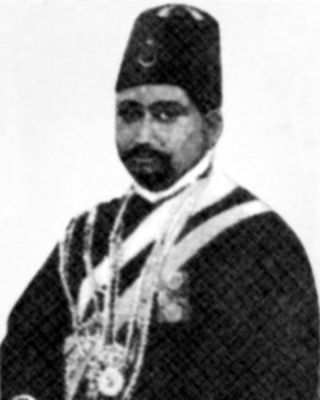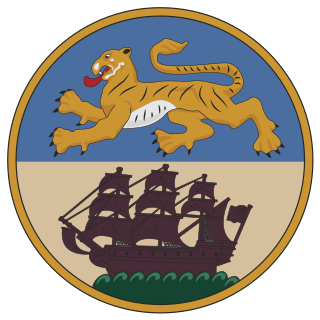Related Research Articles

Kushtia District is a district in the Khulna administrative division of western Bangladesh. Kushtia is the second largest municipality in Bangladesh and the eleventh largest city in the country. Kushtia has existed as a separate district since the partition of India. Prior to that, Kushtia was a part of Nadia district. Kushtia is the birthplace of many historical figures including Mir Mosharraf Hossain (1847–1912), Bagha Jatin (1879–1915) and Lalon (1774–1890). Nobel laureate poet Rabindranath Tagore lived his early life at Shelaidaha, a village in the district.

Manikganj is a district in central Bangladesh and part of the Dhaka Division. Established in 1845, it was a subdivision of Faridpur District until, in 1953, it was transferred to Dhaka District for administrative purposes. In 1984, Manikganj was declared a full district.

The Curzon Hall is a British Raj-era building and home of the Faculty of Sciences at the University of Dhaka, located in Shahbagh.
Events from the year 1948 in Pakistan.

Syed Ismail Hossain Siraji was a Bengali author and poet from Sirajganj in present-day Bangladesh. He is considered to be one of the key authors of period of the Bengali Muslim reawakening; encouraging education and glorifying the Islamic heritage. He also contributed greatly to introducing the Khilafat Movement in Bengal, and provided medical supplies to the Ottoman Empire during the Balkan Wars. Anal-Prabaha, his first poetry book, was banned by the government and he was subsequently imprisoned as the first South Asian poet to allegedly call for independence against the British Raj. The government issued Section 144 against him 82 times in his lifetime.

Mujibnagar, formerly known as Baidyanathtala (Boiddonathtola) and Bhoborpara, is a town in the Mujibnagar Upazila of Meherpur District in Khulna, Bangladesh. The Provisional Government of Bangladesh was formed on 10 April 1971, however, sworn in on 17 April 1971 in this place by the elected representatives of the Bengalees, that led the Bangladesh Liberation War, who were leading the guerrilla war for the independence of Bangladesh from Pakistan in 1971. The place was renamed Mujibnagar by the proclamation of independence, in honour of then imprisoned Sheikh Mujibur Rahman, who had declared Bangladesh independent. The actual capital of the government while in exile was Calcutta. A memorial complex covering 20.10 acres (8.13 ha) has been built at the site where the ministers of that first government took their oaths.

Raozan Upazila is an upazila of Chattogram District, in Chattogram Division, Bangladesh. It was established in 1947.

Mymensingh Zilla School, also known as MZS, is a boys' public secondary school in Mymensingh, Bangladesh. The school was established as Hardinge School during the British Raj in 1846 and got its current name, Mymensingh Zilla School on 3 November 1853.

Barishal Zilla School, popularly known as BZS, is a public educational institution for boys, located in Barisal, Bangladesh. It was the first high school established in Barisal Division. Founded as Barisal English School on 23 December 1829 by W. N. Garrett, it began with 27 students. In 1853, the school was renamed Barisal Zilla School.
Sarkar is a historical administrative division, used mostly in the Mughal Empire. It was a division of a Subah or province. A sarkar was further divided into Mahallas or Parganas.

Dighapatia Raj was a zamindari in present-day Rajshahi, which was ruled by this dynasty of 7 generations of Rajas from early 18th century till the mid-20th century; when the democratic government took power after the end of the British Monarchy's rule in India, in 1950, the East Pakistan government abolished aristocracies and the zamindari system in present-day Bangladesh. The family was seated at the Dighapatia Palace.

The Assam Bengal Railway (ABR) was one of the pioneering railway companies in British India. Headquartered in Chittagong, it functioned from 1892 to 1942.

The divisions of Bangladesh are further divided into districts or zilas. The headquarters of a district is called the district seat. There are 64 districts in Bangladesh. The districts are further subdivided into 495 subdistricts or upazilas.

The fauna of Bangladesh includes about 1,600 species of vertebrate fauna and about 1,000 species of invertebrate fauna based on incomplete records. The vertebrate fauna consists of roughly 22 species of amphibians, 708 species of fish, 126 species of reptiles, 628 species of birds and 113 species of mammals. The invertebrate fauna includes about 30 species of aphids, 20 species of bees, 178 species of beetles, 135 species of flies, 400 species of spiders, 150 species of lepidopterans 52 species of decapods, 30 species of copepods, 2 species of starfish, and some species of sand dollars, sea cucumbers, and sea urchins.

The Sylheti or Sylhetis are an Indo-Aryan ethnocultural group that are associated with the Sylhet region. There are strong diasporic communities in Barak Valley of Assam, India, North Tripura, as well as in rest of Bangladesh and northeast India. They speak Sylheti, an Eastern Indo-Aryan language that is considered "a distinct language by many and a dialect of Bengali by some others".

The Prime Minister of Bengal was the head of government of Bengal Province and the Leader of the House in the Bengal Legislative Assembly in British India. The position was dissolved upon the Partition of Bengal during the partition of India in 1947.
Ashrafuddin Ahmad Chowdhury was a Bengali politician who had served as general secretary of the Congress Party's Bengal branch, member of the East Bengal Legislative Assembly and later as the Education Minister of Pakistan. He was an advocate of Huseyn Shaheed Suhrawardy's United Bengal proposal.

The Bengal Legislative Assembly was the largest legislature in British India, serving as the lower chamber of the legislature of Bengal. It was established under the Government of India Act 1935. The assembly played an important role in the final decade of undivided Bengal. The Leader of the House was the Prime Minister of Bengal. The assembly's lifespan covered the anti-feudal movement of the Krishak Praja Party, the period of World War II, the Lahore Resolution, the Quit India movement, suggestions for a United Bengal and the partition of Bengal and partition of British India.
Adamjee Literary Award, also known as Adamjee Prize, is a literary award bestowed by the government of Pakistan. It is presented by the president. The award seeks to recognize those people who have made "meritorious contribution" to the literature of Pakistan. It was first introduced by Pakistan Writers' Guild in 1959. Muhammad Shahidullah served as the permanent chairman of the award.
References
- ↑ Sultana, Kishwar (2003). "Women's Rights as Propounded by Fatima Jinnah". The Pakistan Development Review. 42 (4): 761–764. doi: 10.30541/v42i4IIpp.761-764 . ISSN 0030-9729. JSTOR 41260435.
- ↑ "Students Islamic Movement of India (SIMI)". South Asia Analysis Group website. Archived from the original on 20 July 2006. Retrieved 28 August 2023.
- Hannan, Mohammad (2012). "Student Politics". In Islam, Sirajul; Jamal, Ahmed A. (eds.). Banglapedia: National Encyclopedia of Bangladesh (Second ed.). Asiatic Society of Bangladesh.
- Roy, Ranjit (2012). "All Bengal Muslim Students' Association". In Islam, Sirajul; Jamal, Ahmed A. (eds.). Banglapedia: National Encyclopedia of Bangladesh (Second ed.). Asiatic Society of Bangladesh.


